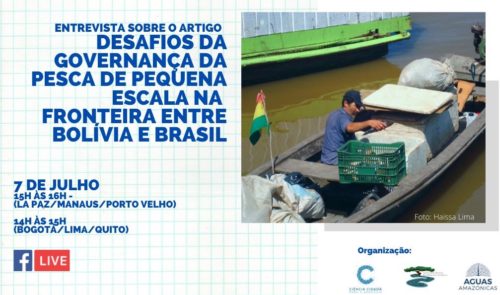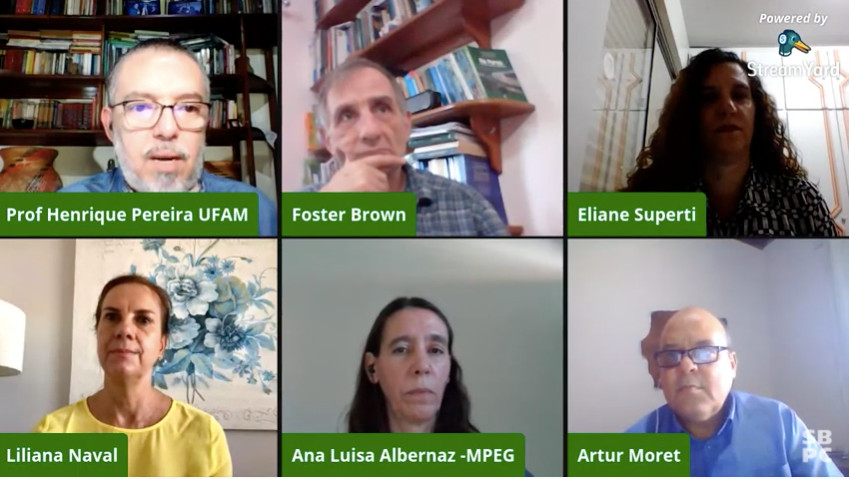The Governance and Infrastructure in the Amazon Project is led by the University of Florida Tropical Conservation and Development Program and aims to create, strengthen and expand a Community of Practice and Learning (CoP-L) for exchanges of experiences and reflection on the use of tools and strategies for infrastructure governance by conservation and development practitioners in the Amazon.
In this 5th edition of GIA’s newsletter we introduce some of our community leader partners from the Alto Madeira (Bolivia-Brazil) Mosaic, as well as a group of students from the Amazon University of Pando, Bolivia who recently defended their research proposals to work with these communities. We also share several past and future events that relate to governance, conservation and infrastructure in the Amazon. Happy reading!
Meet local leaders from Upper Madera Mosaic
Having recently introduced local leaders from Brazil and Colombia, we proudly share brief bios and testimonials from Lidia Antty Antty, Abraham Cartagena and Herlan Domínguez, leaders of the Organización Comunal de la Mujer Amazónica (OCMA), the Asociación de Pescadores de Cachuela Esperanza, and the Comité Defensor de la Vida Amazónica en la Cuenta del Río Madera. They describe their experiences as leaders of local organizations and their struggles to address the impacts of dams on the Madera river while negotiating with companies, governments, and political leaders. The GIA Upper Madera Community of Practice and Learning helps to support these organizations by building capacity and access to information, as illustrated by the UAP student research initiative described below. A prime example of how GIA links academia, NGOs, and community organizations in a space for learning and collaboration to improve infrastructure governance.
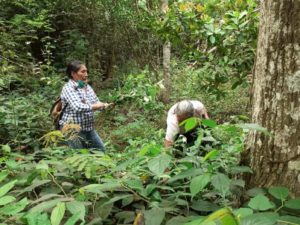
Lidia Antty Antty
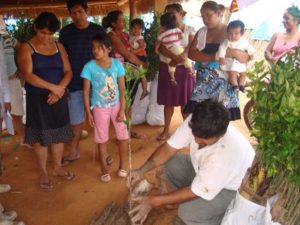
Herlan Domínguez
Please, access their brief bios and testimonials here.
GIA / UAP Course: Seven Academic Heroes
As part of the UF-GIA partnership with the Amazon University of Pando (UAP) in Cobija, Bolivia, seven students have completed an online “Research Methodology” course, defended thesis proposals, and are now planning field work and data collection related to impacts and governance of dams in the Madera basin. The students are from six academic colleges at UAP (Law, Biology, Political Science and Public Management, Social Work, Environmental Engineering and Accounting). The intensive nine-week course was taught by GIA Co-Coordinator Andrea Chavez and thesis proposals were defended virtually with UF and local authorities on July 14th.
All students knew the online course was going to be a challenge: they had to dive into a new academic territory in an extremely short amount of time; amidst a strictly enforced quarantine lockdown; inefficient internet options; limited research exchange possibilities; and, for some, learning and writing with COVID-19 symptoms in the house and family. Despite the obstacles for a healthy learning environment, the desire to learn and be part of the GIA-UAP learning partnership exceeded every challenging moment. “The participation in the course kept us motivated to think in terms of achieving our thesis goal” affirmed one of the finalizing students. Support and mentorship will continue from GIA, UAP and the Upper Madera mosaic partners.
Learn more about news and events in the GIA Focal Mosaics!
3rd Workshop of the International Research Network on Amazon Dams
The 3rd Workshop of the International Research Network on Amazon Dams (ADN), “Hydroelectric Dams in the Amazon: Governance, Adaptive Management and Alternatives,” begins soon. The event will be online, with thematic sessions to be held on five alternate Fridays, starting August 7, 2020. The objectives of this workshop are to produce recommendations to improve planning and manage socio-environmental impacts of hydroelectric dams in the Amazon, and to present alternatives to hydraulic energy. The program includes lectures, open discussions, launch of the e-book “Rivers, Lands and Cultures: Learning from the Tocantins Social-Ecological System” and a video room with academic works. Workshop page on the ADN website here. Registration and submission platform here.
Challenges for the Governance of Small-Scale Fisheries on the Brazil-Bolivia Transboundary Region
Small-scale fishing is very important in the Amazon Basin. The recently launched article “Challenges for the governance of small-scale fisheries on the border between Bolivia and Brazil” shows that, historically, governance can empower fishermen and ensure sustainable fishing; but in border regions, as is the case between the cities of Guajarámerin in Bolivia and Guajará-Mirim in Brazil, the weakness of institutional arrangements can leave fishing vulnerable to emergent threats. From a local perspective, Guillermo Estupiñán (WCS) and Gerônima Melo (Z-2 Fisheries Colony of Guajará-Mirim, Rondônia) interview lead author Carolina Doria (Federal University of Rondônia – UNIR). Access the interview here. Information about the article here.
GIA members participate in the Sustainable Highways in the Amazon Webinar: the Case of BR-319
Is it possible to have sustainable highways in the Amazon and what are the requirements for this? What are the challenges to make BR-319 considered sustainable? These questions guided the webinar promoted by the Brazilian Network of Experts in Transport Ecology (REET) with the participation of 8 specialists from various sectors working in the region. Consensus findings were that it is difficult to consider and make BR-319 sustainable, but it is possible to mitigate the socio-environmental impacts. The biggest challenges are land tenure regularization, the allocation of public lands, the increase in the state’s presence, and the strengthening of local communities. More information about the content here (in Portuguese). Access the webinar here.
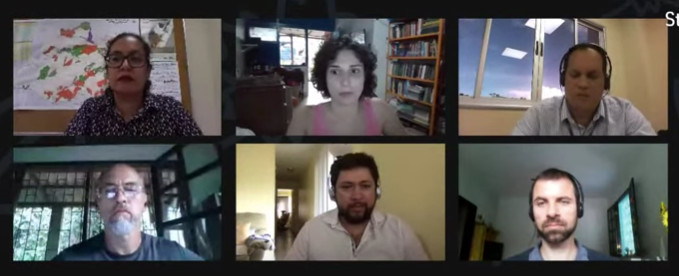
The RECAM Network (Rede de Capacitação da Amazônia, in Portuguese) is a Brazilian multi-organizational network that was created in 2013. The members include mostly regional and national non-governmental organizations (NGOs) that work in the Amazon, but also universities, funding agencies, a private foundation, and a state government program. RECAM was created with the idea of exchanging experiences related to environmental governance and capacity building, but with time has expanded its role and themes of interest. UF/TCD has been a part of the network since its beginning and this year is the facilitator organization. There are many complementarities between GIA and RECAM, and we invite GIA partners to participate in future RECAM discussions and activities. Visit RECAM page on Facebook here.
The manifestations of environmental crises in the Amazon under the eyes of sustainability sciences
Mediated by Professor Henrique Pereira of the Federal University of Amazonas, the webinar featured professors from various Amazon regions who use environmental or sustainability science to assess potential solutions for socio-environmental injustices and accelerate virtuous processes of sustainable and inclusive development of local societies. Panelists were Ana Luisa Albernaz (Museu Emilio Goeldi), Eliane Superti (Federal University of Paraíba), Liliana Pena Naval (Federal University of Tocantins), Foster Brown (Woods Research Center and Universidade Federal do Acre), Artur de Sousa Moret (Federal University of Rondônia) and Edson Damas da Silveira (Prosecutor of the Public Ministry of Roraima and State University of Roraima). More information about the content here (in Portuguese). Access the webinar here.
Nossa Terra audiovisual series
The audiovisual series Nossa Terra presents the results of the 3-year (2016-2019) project that implemented training, workshops and support of productive activities in the Indigenous Lands of Southern Amazonas. There are 7 episodes that show the increasing protagonism of the indigenous organizations of the Tenharim, Parintintim and Jiahui peoples of Southern Amazonas in the joint implementation of the “Nossa Terra” project. Nossa Terra is supported by USAID (United States Agency for International Development), and implemented by IEB (International Institute of Education in Brazil) and OPAN (Operation Amazon Native). Access the audiovisual series here.



